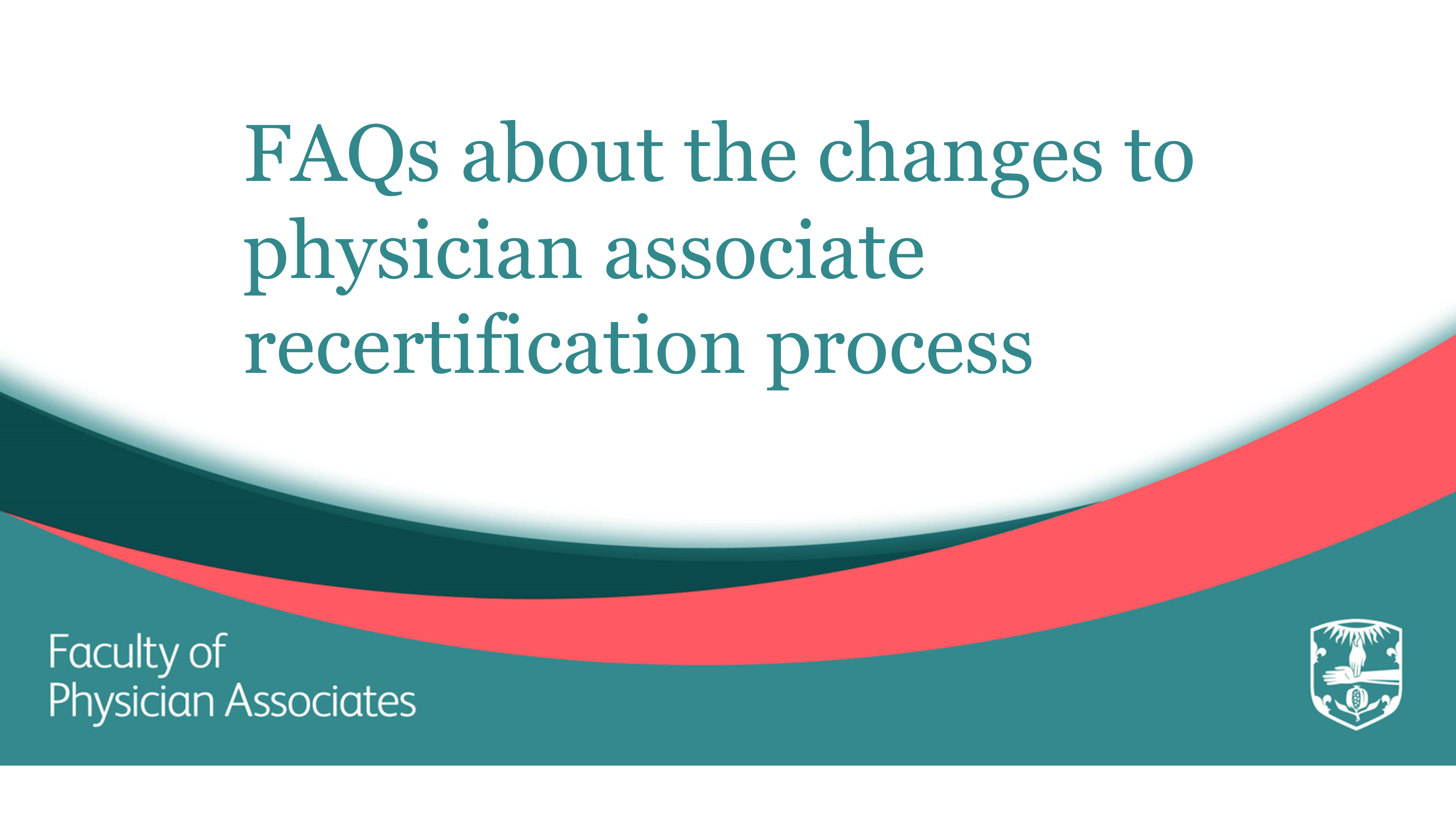Recertification is changing – requirements to remain on the Physician Associate Managed Voluntary Register
The Faculty of Physician Associates (FPA) is the national membership body representing physician associates (PAs) in the UK. As the PA profession moves closer to being regulated by the General Medical Council (GMC), the way that PAs will be required to evidence their ongoing competency and up-to-date knowledge in practice is changing.
What are the current recertification requirements for a PA in the UK?
The Physician Associate Managed Voluntary Register (PAMVR) is held by the FPA. It is currently the only way that PA employers can verify that a PA has either:
- graduated from a UK university PA programme and passed the PA National Examination (PANE); or
- graduated from a nationally recognised USA physician assistant programme and has passed the Physician Assistant National Certifying Examination (PANCE) in the USA and is therefore eligible to practise as a PA in the UK.
PAs on the PAMVR are committed to maintaining good standards of clinical practice, public protection and safety. They are obliged to adhere to the FPA code of conduct and continuing professional development (CPD) requirements.
To remain in good standing, PAs are currently required to pass the PA recertification assessment every 6 years of clinical practice.
FPA ePortfolio and FPA Core Clinical Practice Curriculum
The FPA will launch an ePortfolio for qualified FPA members in October 2023. This new electronic platform will include the FPA Core Clinical Practice Curriculum (CCPC). The CCPC will include all the core areas of practice in which a PA is expected to maintain knowledge, and cover the areas that have traditionally been assessed in the recertification assessment.
Additionally, the ePortfolio will offer qualified members the opportunity to:
- log evidence of clinical competencies. For example, completing direct observation of procedural skills (DOPS), mini clinical evaluation exercise (mini-CEX), and case-based discussion (CBD) forms
- gather multi-source feedback (MSF) and patient feedback forms
- complete the FPA appraisal toolkit
- record CPD.
Combined with the CCPC, the ePortfolio will become the new way in which qualified FPA members can evidence their knowledge in core areas of practice, as well offering PAs the ability to evidence their developing specialty-related clinical knowledge, clinical competencies and feedback electronically.
The FPA ePortfolio and FPA CCPC will be available to all qualified PA members, included as part of their FPA membership at no additional cost.
Making this change now will better support PA members to transition to the future revalidation requirements announced by the GMC today. The change also assures patients and employers that individuals registered on the PAMVR are maintaining the expected standards for PAs, while allowing PAs the flexibility to evidence their core and specialty-related knowledge.
How is recertification changing?
The GMC has today (13 March 2023) announced its revalidation requirements in preparation for regulating PAs – estimated to begin in Q4 2024.
The GMC’s revalidation approach will be based on annual employer appraisal, reflection and local clinical governance - similar to their current approach for doctors. Further detail can be found on the GMC’s website.
The FPA remains committed to ensuring that PAs maintain their generalist knowledge, are fit to practise and ensure they provide safe, evidence-based medical care to patients. The FPA is committed to supporting and preparing our members to become regulated medical professionals. Therefore, the recertification process will be changing as follows:
- From May 2023, PAs registered on the PAMVR will not be required to sit a National Recertification Assessment as a condition of membership to remain on the PAMVR.
- From October 2023, all PAs registered on the PAMVR will be required to engage with the FPA Core Clinical Practice Curriculum (CCPC) via the FPA ePortfolio to remain in good standing and listed on the PAMVR.
Physician associate regulation
In 2019, the government committed to introducing regulation for PAs, and since then the Department for Health and Social Care (DHSC) has been drafting legislation to enable the GMC to introduce statutory regulation of PAs.
In February 2023, the DHSC published its consultation on draft legislation to bring PAs into regulation. It is expected that the legislation will be laid before parliament towards the end of 2023 and that the GMC to be able to open a register for PAs at the end of 2024. Read the FPA statement regarding this announcement.
Until the GMC opens a register for PAs, the PAMVR remains the only way an employer, or member of the public, can ensure that a PA is fully qualified, is obliged to adhere to the FPA code of conduct and CPD requirements, and is engaging with the newly implemented recertification process outlined above.
The FPA signposts employers and PAs to two guidance documents, which state that PAs working in the NHS should be registered on the PAMVR. They are:

